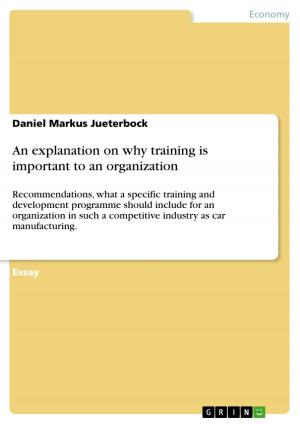Female Virginity and Male Desire in Seventeenth Century Carpe Diem Poetry
Robert Herrick's 'To the Virgins, to Make Much of Time' and Andrew Marvell's 'To His Coy Mistress'
Nonfiction, Reference & Language, Study Aids, ESL, Foreign Languages| Author: | Romina Müller | ISBN: | 9783640955343 |
| Publisher: | GRIN Publishing | Publication: | July 11, 2011 |
| Imprint: | GRIN Publishing | Language: | English |
| Author: | Romina Müller |
| ISBN: | 9783640955343 |
| Publisher: | GRIN Publishing |
| Publication: | July 11, 2011 |
| Imprint: | GRIN Publishing |
| Language: | English |
Essay from the year 2011 in the subject English - Grammar, Style, Working Technique, grade: A, Lindenwood University (-), language: English, abstract: Back in the seventeenth century, a woman's responsibility was to preserve her virginity until marriage. A woman who had sexual intercourse before her wedding was considered undesirable and a slut. At the same time, men had sexual needs and desires that they wanted to fulfill, may they be married to the woman of their choice or not. Dealing with this issue of virginity and the concept of using time to its fullest (carpe diem-Latin for 'seize the day') are two of the most famous poems of this time. Robert Herrick's 'To the Virgins, to Make Much of Time' as well as Andrew Marvell's 'To His Coy Mistress' have a similar opinion about how a woman should use her youth and virginity, but have different ideas about whether to get married first or not.
Essay from the year 2011 in the subject English - Grammar, Style, Working Technique, grade: A, Lindenwood University (-), language: English, abstract: Back in the seventeenth century, a woman's responsibility was to preserve her virginity until marriage. A woman who had sexual intercourse before her wedding was considered undesirable and a slut. At the same time, men had sexual needs and desires that they wanted to fulfill, may they be married to the woman of their choice or not. Dealing with this issue of virginity and the concept of using time to its fullest (carpe diem-Latin for 'seize the day') are two of the most famous poems of this time. Robert Herrick's 'To the Virgins, to Make Much of Time' as well as Andrew Marvell's 'To His Coy Mistress' have a similar opinion about how a woman should use her youth and virginity, but have different ideas about whether to get married first or not.















